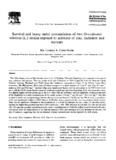Survival and heavy metal accumulation of two Oreochromis niloticus (L.) strains exposed to mixtures of zinc, cadmium and mercury
Share
Abstract
Two Nile tilapia strains of Oreochromis niloticus (L.) (Cichlidae, Teleostei) fingerlings were exposed to mixtures of zinc, cadmium and mercury. The two strains used were Chitralada or NIFI (originally from the National Inland Fisheries Institute, Thailand) and CLSU (from the Freshwater Aquaculture Center of the Central Luzon State University, The Philippines). Short-term (10 days) exposure to a metal mixture of 5 mg 1−1 zinc (Zn), 0.5 mg 1−1 cadmium (Cd) and 0.02 mg l−1 mercury (Hg) gave significantly higher survival percentage in the NIFI strain compared with the CLSU strain. Similar exposure conditions using larger and older fingerlings of the two strains also showed a slightly higher survival percentage in the NIFI strain but the difference was not significant. Prolonged exposure of the fingerlings to a lower concentration of the metal mixture (1.0 mg l−1 Zn, 0.1 mg l−1 Cd, 0.01 mg l−1 Hg) also resulted in similar survival percentages between the two strains at the end of the 60 days run. Whole body accumulation of Zn was significantly higher in CLSU than in NIFI after 14-day exposure to the low concentration metal mixture. There was no significant difference in the accumulation of Cd and Hg between the two strains. Of the three metals, Hg had the highest bioaccumulation factor (BF) which was ∼900–1000, followed by Cd with 255–280 and Zn with 180–195 times the nominal concentration in the water. Concentration of Cd and Hg in fish tissues increased with exposure period while the concentration of Zn was maintained in NIFI and decreased in CLSU between the 6th and 14th day of exposure, suggesting that Zn (an essential element) accumulation maybe regulated by both strains.
Suggested Citation
Cuvin-Aralar, M. L. A. (1994). Survival and heavy metal accumulation of two Oreochromis niloticus (L.) strains exposed to mixtures of zinc, cadmium and mercury. Science of the Total Environment , 148(1), 31-38. https://doi.org/10.1016/0048-9697(94)90370-0
Subject
Collections
- AQD Journal Articles [1249]

